Spinal Surgery (spinal Disc Replacement) in Germany
Here you will find most technologically advanced spinal surgery hospitals in Germany
Focus of treatment:
- Cervical spinal disc herniation
- Cervical spinal stenosis
- Chronic spinal pain
- Ependymoma
- Ependymoma
- Facet syndrome
- Failed back surgery syndrome
- Intramedullary spinal cord hematoma
- Lumbar spinal disc herniation
- Lumbar spinal stenosis
- Neck Neurinoma
- Osteochondrosis
- Spastic syndrome
- Spinal astrocytoma
- Spinal cord empyema
- Spinal cord lipoma
- Spinal cord malignant tumor
- Spinal meningioma
- Spinal neurinoma
- Syringomyelia Show more
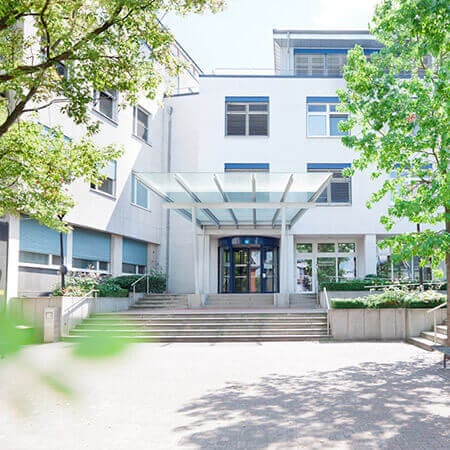
Department of Spinal Surgery
The Department of Spinal Surgery is part of the specialized Center for Musculoskeletal Disorders, in which spinal surgeons, orthopedists, and trauma surgeons work in close cooperation for the benefit of patients. The department provides both conservative and surgical treatment of all back pain syndromes, which can be caused by d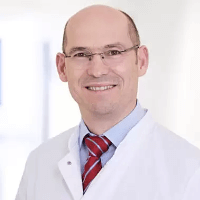
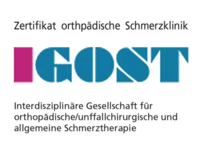

Department of Spinal Surgery
The Department of Spinal Surgery at the Vivantes Auguste-Victoria Hospital all diseases of the spine - both conservatively and operatively. Patients with herniated intervertebral discs, displacement of vertebrae, stenosis of the spinal canal or back pain are treated here. In addition, specialists of the department have a unique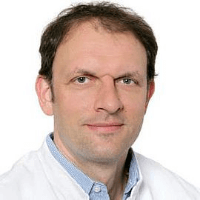
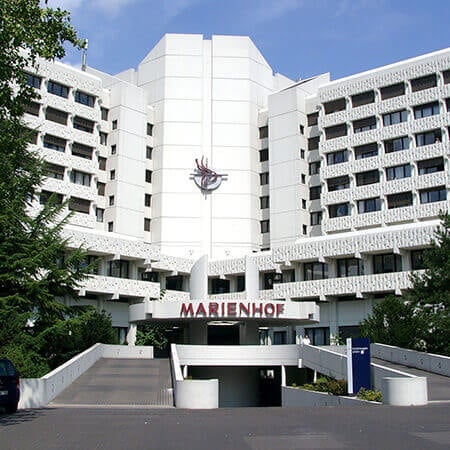
Department of Spinal Surgery
The Department of Spinal Surgery offers the full range of effective treatment methods in the area of its specialization. A highly qualified team of doctors is at the service of the department's patients, who have in their arsenal advanced conservative and surgical treatment methods for pathological changes in the spine. Spin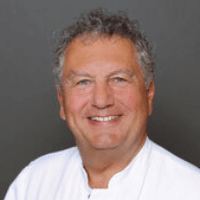
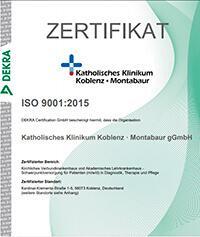

Medicine in Germany has reached the highest level of development. Doctors in this country successfully treat even the most severe pathologies, such as oncological, cardiovascular, orthopedic, neurological diseases. Many patients visit German hospitals for spine surgery and spinal cord surgery. Spinal surgery can be performed for injuries, spinal disc herniation, tumors, scoliosis, facet syndrome and other pathologies. The development of medicine in Germany makes it possible to provide treatment of many diseases with minimally invasive surgical techniques.
Content
- Minimally invasive surgery
- Minimally invasive treatment of spinal disc herniation
- Replacement surgery
- Spinal cord tumors
- Spinal hemorrhagic stroke treatment
- Why is it worth undergoing treatment in Germany
- Treatment in Europe with Booking Health at an affordable price
Minimally invasive surgery
Any surgical intervention consists of two stages: the surgical approach and the actual surgical manipulations performed to treat the disease. A minimally invasive technique is one in which the depth of the wound exceeds its length. In Germany, minimally invasive spine surgery is being used more and more often, as it is associated with less trauma, ensures quick recovery and good functional outcomes.
When performing spinal operations, it is important not to injure the ligaments, nerves, spinal cord, large vessels, to avoid significant damage to the bone structures. German surgeons are perfectly oriented in the patient's spine, as they use the latest imaging techniques. They are especially important for minimally invasive interventions. For navigation, doctors use CT and MRI scanning. New technologies provide virtual imaging through layer-by-layer tissue analysis. With intraoperative imaging, neurosurgeons can:
- Select the surgical access along the optimal trajectory.
- Avoid tissue lesions.
- Cure the disease with minimally traumatic techniques, without complications.
Modern spinal surgery is associated with the development of technical equipment in medicine. Hospitals in Germany have no shortage of quality medical equipment. Especially considering that many devices are made in Germany itself. German spinal surgeons use the following devices:
- X-ray transparent operating tables – they allow doctors to position the patient in order to obtain an optimal intraoperative image of the surgical area in real time.
- Electro-optical converters.
- Neuronavigation systems.
- Surgical microscopes.
- Endoscopes.
- Power equipment for manipulating bone tissue.
- Retractor systems and special instruments that provide the possibility of high-precision manipulations at any depth.
Some hospitals use robot-assisted systems that allow for perfect manipulation in a restricted space.
High-quality spine surgery in Germany is provided not only by devices, but also by medical personnel. The neurosurgeons in this country are undergoing high-quality professional training. The best doctors from all over the world go to work in the country in search of professional growth.
Minimally invasive treatment of spinal disc herniation
Spinal disc herniation is the most common indication for a neurosurgical intervention. The standard treatment implies a microsurgical procedure. Through an incision several centimeters long, the doctor removes part of the disc along with the hernia. At the same time, he has to remove bone tissue in order to gain access to the disc. This can compromise the stability of the spine. The implantation of stabilizing systems prevents instability, but can cause complications.
Nonetheless, specialists in Germany perform most operations using minimally invasive techniques. Doctors practically do not perform bone tissue resection.
Minimally invasive spinal interventions have the following advantages:
- Less blood loss – about 100 ml instead of 300-600 ml.
- Getting out of bed on the day of the surgery, but not after 3-4 days.
- Hospital stay – 1-2 days instead of 5-7 days.
- Full return to active life after 1-1.5 months, but not after 4-6 months, as after the classic intervention on the spine.
- Surgical procedures can be performed under local anesthesia.
- Low risk of complications.
Percutaneous endoscopic discectomy. In hospitals in Germany, this is the main surgical intervention for the treatment of hernias. The procedure is minimally traumatic. The doctor makes an incision with a length of 0.4 cm. He inserts an endoscope with a diameter of 0.7 mm through it. To avoid damage to the healthy tissues, the procedure is performed under X-ray guidance. There is no need to resect the bone: the endoscope penetrates through natural spaces in the vertebrae. As a result, there is no risk of spinal instability. The surgical procedure is practically bloodless, since the vessels are instantly coagulated by the radiofrequency method. The surgical wound is minimal. The resulting scar is small. The person is discharged from the hospital the very next day. In Germany, the efficiency of this surgical intervention reaches 98%. After this surgery, a person can quickly return to physical labor and sports.
Percutaneous nucleotomy. The procedure involves the removal of the protruding part of the intervertebral disc with a nucleotome. It is a thin, spiral-shaped rotating probe. Sometimes cold plasma is used instead to destroy the hernia. After this manipulation, back or neck pain disappears instantly. No rehabilitation is needed. The effectiveness of the technique is 85%. It is even less traumatic than endoscopic discectomy. However, the procedure can be used only for small hernias.
In some patients, German doctors perform open surgical interventions, such as microdiscectomy. However, even this operation is less traumatic in comparison with the classical technique. Microdiscectomy is usually performed through an incision up to 4 cm, and in Germany it is only 1.5-2 cm. When performing the operation, doctors often strengthen the fibrous ring with a laser to avoid the recurrence of hernias.
Replacement surgery
In case of severe injuries of the intervertebral discs, replacement surgery can be performed in hospitals in Germany. Doctors are replacing the disc with an implant. Surgeons can perform replacement of both the entire disc and its part, namely the nucleus pulposus.
This is an alternative to another method of treatment – spinal fusion. In the course of this surgical intervention, the doctor removes the disc, but instead of replacing it, he simply connects the vertebrae. As a result, there is no more mobility in this part of the spine. The patient does not feel this in any way, but the problem is that over time the adjacent intervertebral discs and vertebrae may suffer.
Spinal disc replacement in Germany solves this problem. After replacement surgery, the spinal column remains mobile, while the height of the intervertebral space does not decrease. It is a more physiological method of treatment that provides better long-term results.
The technologies for the production of artificial discs for replacement are constantly being improved. Prostheses become strong and durable. German titanium implants for spinal disc replacement are used not only in the departments of surgery in Germany, but also in neurosurgical centers around the world.
A more sparing surgical intervention is a partial disc replacement. Doctors only perform the replacement of the nucleus pulposus. Neurosurgeons replace it with two small polymer pads. After such an intervention, patients receive a similar functional outcome, but recover quickly.
Some hospitals use experimental treatment methods. Stem cells are injected into the damaged discs in patients, thus triggering their biological renewal. The manipulations are performed endoscopically, and therefore the method of treatment is minimally invasive. The transplanted tissue is not rejected because doctors use autologous (the patient's own) stem cells, but not donor stem cells.
Spinal cord tumors
Spinal cord neoplasms are not so common in medicine, but they are severe. Without treatment, even benign lesions can lead to severe neurological deficits.
The spinal cord is more often affected by benign tumors than malignant ones. The doctor's task is to remove it, if possible, completely. In this case, the risk of recurrence is lower.
Whenever possible, the neurosurgeon removes the tumor using an en bloc technique. It is not always possible to perform such an intervention. The doctor then removes the neoplasm in parts. It is especially difficult to remove tumors with infiltrative growth that invade the spinal cord tissues. To distinguish normal tissues from pathological ones, German surgeons use special dyes. They are used for malignant neoplasms. The doctor seeks to remove as much tumor tissue as possible, while causing the least neurological deficit.
When removing tumors in Germany, intraoperative neuroimaging and neuronavigation are used. If necessary, an electrophysiological study can be used as well. The tumor is removed prior to the onset of the first signs of spinal cord dysfunction.
To remove some benign neoplasms, minimally invasive procedures are used in medicine. For example, a lipoma is not resected, but destroyed by ultrasound. The tumor turns into liquid, which is then sucked off with an aspirator. In some hospitals, neoplasms are vaporized with a laser. With such an approach, doctors can remove small tumors.
Spinal hemorrhagic stroke treatment
Spinal hemorrhagic stroke is the development of a hematoma in the spinal cord as a result of hemorrhage. Hematomas can be large and often spread over several segments.
The foci of hemorrhage can be:
- Intracerebral.
- Meningeal.
Among the meningeal hemorrhages, subarachnoid hemorrhages are more common, while epidural ones occur less often, and they are usually the result of injury.
Doctors in Germany remove large hematomas using surgery. To avoid irreversible damage to the spinal cord tissue, it is important to remove them as early as possible. The later the operation is performed, the higher the risk of residual neurological deficit: muscle weakness, deterioration in the pelvic organ function, impaired sensitivity in the innervation zone of the involved spinal cord segments.
In addition to removing the hematoma itself, doctors treat the underlying disease that led to the stroke. In case of injury, bone fragments are repositioned. With coagulopathies, doctors conduct specific treatment. As a rule, it is replacement therapy with blood coagulation factors, platelet transfusion. If the source of bleeding is arteriovenous malformation, it is eliminated using the endovascular technique, microsurgery, or radiation.
Why is it worth undergoing treatment in Germany
Foreign patients often visit hospitals in Germany to undergo spinal surgery. In this case, they can be sure that the surgeons will not only cure the disease, but also do it with the most sparing surgical techniques, with a low risk of complications. There are several reasons for you to go to Germany for spinal surgery:
- State-of-the-art equipment in hospitals makes treatment less traumatic and safer.
- High-precision diagnostics and intraoperative navigation.
- Minimally traumatic interventions through short 0.5 cm skin incisions.
- Bone structures are not damaged during the operation, which eliminates the violation of the stability of the spine.
- The efficiency of most surgical procedures is over 90%. Pain and other symptoms disappear almost immediately after surgery.
- Successful performance of even the most complex surgeries: for spinal injuries, spinal cord tumors, spinal disc replacement surgery.
- Doctors avoid operations in which the mobility of the spinal column is impaired in order to avoid damage to other parts of the spine.
- Minimal risk of damage to large nerves, blood vessels, spinal cord.
- Low risk of recurrence when removing tumors.
- In German hospitals, you will be provided with comfortable conditions, quality care, adequate pain relief and symptomatic therapy
Treatment in Europe with Booking Health at an affordable price
For spinal surgery in one of the European hospitals, please use the services of the Booking Health company. On our website, you can find out the cost of treatment in different hospitals, compare prices and book a medical care program at a favorable price. Surgical treatment of spinal diseases in European hospitals will be easier and faster for you, and the cost of treatment will be lower.
Please leave your request on the Booking Health website. Our employee will contact you and advise you about treatment in Europe. Booking Health will take care of the organization of your trip. We will provide the following benefits for you:
- We will select a hospital for treatment in Europe, whose doctors specialize in the treatment of the spine.
- We will help you overcome the language barrier, establish communication with your attending physician.
- We will reduce the waiting time for the start of the medical care program and book a doctor's appointment on the most suitable dates.
- We will reduce the price. The cost of treatment in European hospitals will be lower due to the lack of additional coefficients for foreign patients.
- We will take care of all organizational issues: documents for entering the country, transfer from the airport, hotel, interpreting services, etc.
- We will prepare a program and translate medical documents. You do not have to repeat the previously performed diagnostic procedures.
- We will provide communication with the hospital after treatment in Europe.
- We will organize additional medical examinations and treatment in European hospitals, if necessary.
- We will buy medicines abroad and forward them to your native country.
- We will help you keep in touch with the hospital and the doctor after treatment in Europe.
You will receive treatment from the best doctors in the world. The Booking Health employees will help reduce the cost of treatment and take care of all organizational issues, and you will only have to focus on restoring your health.
Authors: Dr. Vadim Zhiliuk, Dr. Sergey Pashchenko

